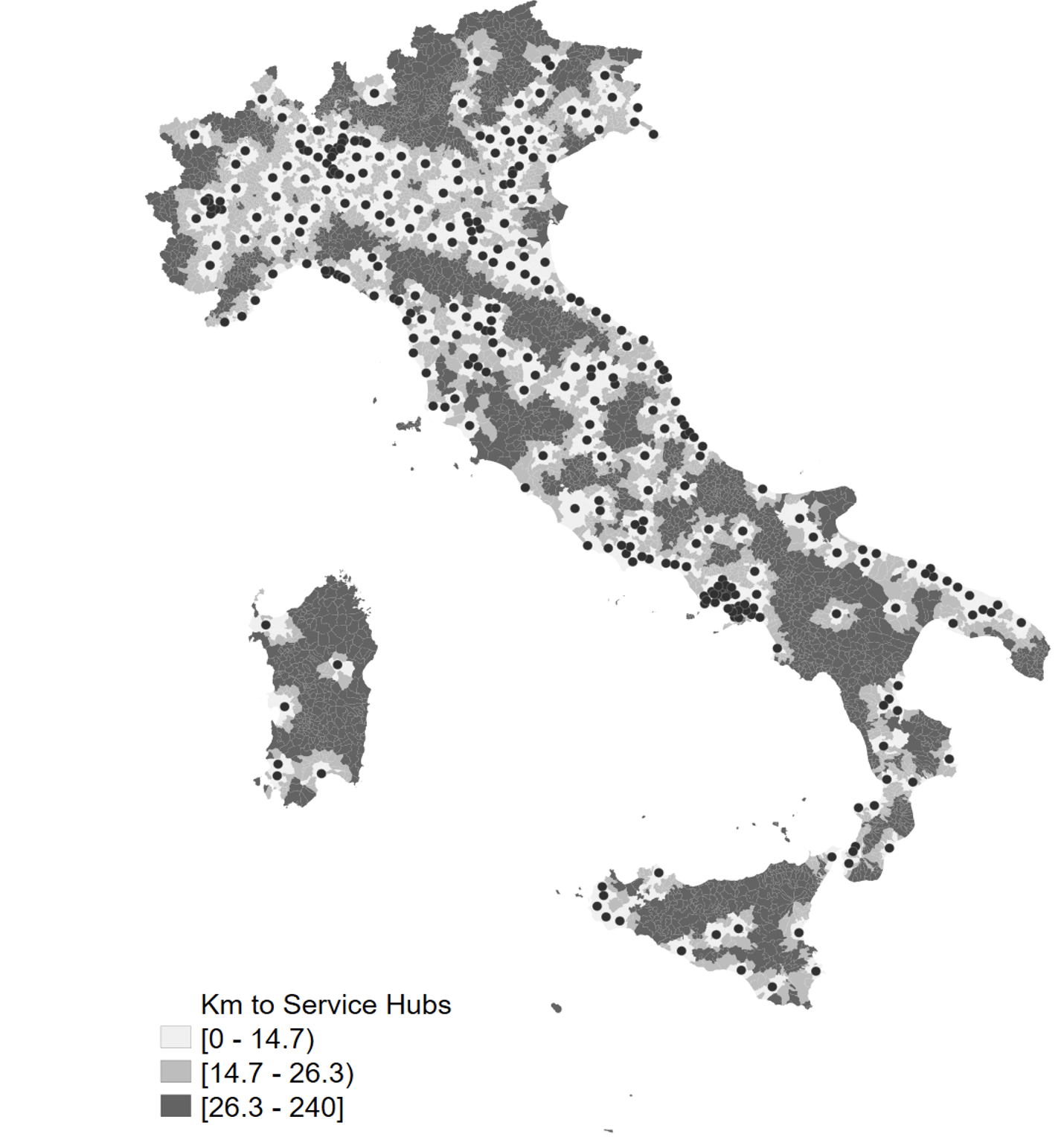Far-right parties across the globe have made significant electoral gains in recent years. Some of them have even been able to defeat traditional cordons sanitaires that actively prevented them from governing. The recently formed Italian government is a case in point, with Giorgia Meloni becoming the most far-right prime minister since fascist rule under Mussolini.
Existing research identifies two main drivers of the rise of the far right: material concerns stemming from local exposure to globalisation, trade shocks, and changing labour markets (Colantone and Stanig 2018, Walter 2021); and cultural concerns relating to migration shocks or demographic patterns (Dancygier and Laitin 2014, Dinas et al. 2019). Less attention has been given to how people’s experiences with the state affect the success of far-right parties. This is somewhat surprising given the anti-elite rhetoric at the heart of the rise of the far right (De Vries and Hobolt 2020).
In a recent paper (Cremaschi et al. 2022), we argue that public service deprivation – defined as reduced access to local public services (Barca et al. 2012) – helps explain the electoral success of the far right. Access to local public services provides residents with both material resources – such as healthcare, schooling, and transport – and communal benefits, by defining the boundaries of political community and the meaning of citizenship. When people experience a loss of material and communal resources at the local level, they not only become disgruntled with politics but worry more about immigration and increased competition for reduced public services. By sparking fears about immigration, public service deprivation increases the appeal of the far right, which advocates restricting immigration and immigrants’ rights to supposedly reduce the strain on local public services. We empirically test our argument with evidence from Italy, a country characterised by an early rise in the far right and extensive variation in public service deprivation.
Public service deprivation
Local public service provision is one of the most direct ways in which politics affects citizens’ lives. It provides a tangible basis for evaluating how taxes are being spent and how willing the state is to invest in communities (Dowding and John 2012). Public service provision is based on the notion that certain goods, such as schooling, healthcare, and transportation, should be available to everyone, regardless of their income, skills, or other background characteristics, and therefore should be funded collectively through taxation. Many of these services are provided locally to closely meet citizens’ needs and interests (Tiebout 1956). Access to local public services thus defines the boundaries of membership in a political community (Mettler and Soss 2004) and generates expectations that the state should be responsive to citizens’ needs, and what it should provide (Hacker 2002). Even less politically shrewd citizens can relate access to local public services to political behaviour and preferences (Hern 2019).
Public service deprivation generates popular discontent because it signals that the state can no longer adequately provide for citizens’ needs. People who experience reduced access to local public services become disgruntled and more vulnerable to the idea that the state ‘left their communities behind’ and does not provide them with ‘their fair share of resources’ (Cramer 2016).
People’s understanding of how the state should spend their taxes and provide for their communities through local public services is closely related to their perceptions of their community’s ethnic composition (Alesina et al. 2018). As a result, communities that experience public service deprivation become more worried about having to compete with non-natives for access to public services and about immigration more generally. This in turn fuels electoral support for far-right parties that advocate stricter immigration laws and restricting the access of non-natives to local public services.
How public service deprivation fuelled far-right support in Italy
We examine evidence from Italy, where far-right parties have enjoyed electoral success for longer than elsewhere in Europe (De Vries and Hobolt 2020). In particular, our analysis presents evidence from three studies.
Study 1: Distance to public service hubs and far-right electoral returns
In study 1, we introduce a new and fine-grained measure of public service deprivation, defined as reduced access to public services at the local level. This measure captures the driving distance to public service hubs, namely, municipalities or clusters of neighbouring municipalities featuring
- a nationally connected train station
- a hospital offering services beyond an emergency room
- a high school.
Figure 1 shows the classification of Italian municipalities based on our public service deprivation measure and highlights substantial variation in public service deprivation across municipalities.
Figure 1 Public service deprivation in Italy
Using national-level electoral data from 2001 to 2018, we link this measure to municipal electoral returns in Italy and show that it coincides with higher electoral returns for far-right parties. The effect remains robust when we control for municipal-level economic and demographic characteristics.
Study 2: Compulsory joint management of public services and far-right support
In study 2, we exploit a 2010 administrative reform in Italy that forced municipalities below a certain population threshold to jointly manage some of their local public services. This reform was part of an effort by governments across Europe to reduce municipal fragmentation and reduce administrative costs. It introduced the compulsory joint management (gestione associata obbligatoria) of basic public services and required municipalities below a specific population threshold to progressively manage ‘fundamental functions’ jointly by 31 December 2014. We demonstrate the causal relationship between this type of deprivation and far-right support.
For this study, we build a dataset that includes 8,071 municipalities, 67% of which were affected by the reform. Our empirical analysis presents three key results. First, the reform negatively impacted access to local public service provision in affected municipalities for key service areas, namely local police, public registry, and garbage collection. In other words, the reform increased public service deprivation.
Second, we find that exposure to the 2010 reform is associated with a significant increase in the vote share of far-right parties. In fact, our analysis identifies a small but statistically and electorally significant increase of 0.5 percentage points in far-right parties’ vote share caused by the reform.
Finally, we find that the reform’s effect on support for far-right parties is especially pronounced in municipalities where the share of the foreign-born population is higher than the average or has been increasing before the reform. We consider both the share of the foreign-born population in 2008, namely the last election before the reform, and the change in the foreign-born population in the previous 5 years, and find that the reform’s effect on far-right support is largely driven by the affected municipalities in which immigration was higher in the years prior to the reform.
Study 3: Public service deprivation and attitudes towards immigration
Study 3 employs individual-level data from the Italian National Election Studies to explore the mechanisms underlying our findings in greater depth. We assemble data from two panel surveys collected between 2001 and 2013 in eight waves. We examine the effect of the reform on a respondent’s self-positioning on an economic left-right scale and an additive scale capturing the respondent’s concerns about immigration. The scale combines the answers to two survey questions asking respondents how much they agree that immigration is a danger to national identity and culture and to national employment.
The results suggest that residents of municipalities that experienced an increase in public service deprivation due to the 2010 reform became more concerned about immigration and self-identified as further right on the economic left-right dimension. This individual-level evidence is in line with our argument that public service deprivation increases electoral support for the far right by heightening immigration fears.
Conclusion
Overall, our study suggests that citizens’ concerns about public services and the composition of the local population are intertwined. Public service deprivation leads native-born residents to feel they are competing for access to public resources, particularly when combined with a substantial immigrant presence. Far-right rhetoric finds fertile ground in these contexts. Importantly, our results suggest that pro-redistribution parties do not necessarily gain from public services retrenchment. Prior studies on elite behaviour and rhetoric suggest that this might be due to political elites distracting voters from material concerns to cultural ones, such as religiosity, ethnicity, or nationalism (Huber and Stanig 2011, Tavits and Potter 2015). However, our results indicate that people’s experiences with public service deprivation also trigger concerns about immigration – thereby linking material and cultural concerns. The extent to which these patterns apply beyond the Italian case is an important topic for future research. Since Italian politics has been at the forefront of the wave of far-right electoral success in the industrialised world, it is a crucial case to study.
References
Alesina, A, A Miano, and S Stantcheva (2018), “Immigration and redistribution”, NBER Working Paper w24733.
Barca, F, P McCann, and A Rodríguez‐Pose (2012), “The case for regional development intervention: Place‐based versus place‐neutral approaches”, Journal of Regional Science 52(1): 134–52.
Colantone, I, and P Stanig (2018), “Global competition and Brexit”, American Political Science Review 112(2): 201–18.
Cramer, K J (2016), The politics of resentment: Rural consciousness in Wisconsin and the rise of Scott Walker, University of Chicago Press.
Cremaschi, S, P Rettl, M Cappelluti, and C E De Vries (2022), “Geographies of discontent: How public service deprivation increased far-right support in Italy”, OSF Preprints, 26.
Dancygier, R M, and D D Laitin (2014), “Immigration into Europe: Economic discrimination, violence, and public policy”, Annual Review of Political Science 17(1): 43–64.
De Vries, C E, and S B Hobolt (2020), “Political entrepreneurs”, in Political Entrepreneurs, Princeton University Press.
Dinas, E, K Matakos, D Xefteris, and D Hangartner (2019), “Waking up the golden dawn: Does exposure to the refugee crisis increase support for extreme-right parties?”, Political Analysis 27(2): 244–54.
Dowding, K, and P John (2012), Exits, voices and social investment: Citizens’ reaction to public services, Cambridge University Press.
Hacker, J S (2002), The divided welfare state: The battle over public and private social benefits in the US, Cambridge University Press.
Hern, E (2019), Developing states, shaping citizenship: Service delivery and political participation in Zambia, University of Michigan Press.
Huber, J D, and P Stanig (2011), “Church-state separation and redistribution”, Journal of Public Economics 95(7–8): 828–36.
Mettler, S, and J Soss (2004), “The consequences of public policy for democratic citizenship: Bridging policy studies and mass politics”, Perspectives on Politics 2(1): 55–73.
Tavits, M, and J D Potter (2015), “The effect of inequality and social identity on party strategies”, American Journal of Political Science 59(3): 744–58.
Tiebout, C M (1956), “A pure theory of local expenditures”, Journal of Political Economy 64(5): 416–24.
Walter, S (2021), “The backlash against globalization”, Annual Review of Political Science 24(1): 421–42.






